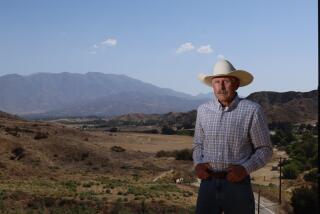Riordan Supports Expansion of Landfill
Foes of a dump in Granada Hills suffered two setbacks Friday as Mayor Richard Riordan said he supports expanding Sunshine Canyon Landfill and another top official concluded that any alternative would be too costly.
The City Council voted 9-5 last month to permit Browning-Ferris Industries to reopen its landfill in Granada Hills, but a final council vote is necessary before the zoning ordinance goes to Riordan.
The mayor did not wait for the final vote, telling a crowd of business leaders during his annual State of the Valley speech that an expanded landfill, with measures to lessen the negative impact on neighbors, is essential to helping the city meet its trash disposal needs for the next 26 years.
Riordan’s position was not unexpected; he had signed a General Plan amendment in February that would allow for a landfill expansion. But his announcement before the final council vote surprised landfill opponents.
“I’m surprised and rather regretful that the announcement was made in advance of the council vote,” said Councilwoman Laura Chick, who attended the annual business forecast meeting of the Valley Industry & Commerce Assn.
Chick said Riordan’s position could “close the door” on hopes of getting council members to change their positions before the final vote.
“I’m really deeply disappointed that he made the decision without getting all the facts about suitable alternatives,” said Councilman Joel Wachs, an opponent of the idea.
Ali Sar, a spokesman for long-time dump foe Councilman Hal Bernson, said the mayor’s decision “shows a lack of understanding of our concerns, especially involving the health issues in the north San Fernando Valley.”
Riordan said he knew he was taking a stand that would be “unpopular with certain people.”
“As mayor of the second-biggest city in the United States, many of my decisions have citywide ramifications,” said Riordan. “Many of these decisions, that I believe are for the good of the whole city, will not please a number of people.
“But you can’t run the city correctly if you want to please 100% of the people.”
Riordan said he and his staff “have to take an overall view of the needs of the city.”
Riordan said he understands nearby residents who oppose the expansion.
“It is tough, I feel for them,” Riordan said.
Final council action had been delayed to allow one last study of alternatives. Chief Legislative Analyst Ron Deaton, who conducted the study, told The Times that transporting trash outside of Los Angeles adds so much to the cost that any alternative to expansion of the landfill would be unwise.
Hauling trash to Lancaster would cost more than $21 a ton, compared with the $18.26 fee at Sunshine, where no additional transportation costs would be incurred.
At the very least, it would cost the city about $8.4 million annually to send trash to a landfill in Lancaster, Deaton said.
The analyst said the transportation cost to get trash to a Rialto landfill would also be about $21, even before the city pays the dump fee.
Yet another option pushed by opponents, a dump near Palm Desert, would cost at least $24 a ton, about 50 cents more per month for each Los Angeles household.
Deaton said there are too many uncertainties about the cost for him to recommend that the city abandon the expansion of Sunshine Canyon.
More to Read
Sign up for Essential California
The most important California stories and recommendations in your inbox every morning.
You may occasionally receive promotional content from the Los Angeles Times.











